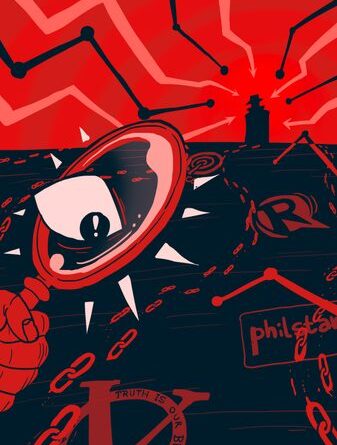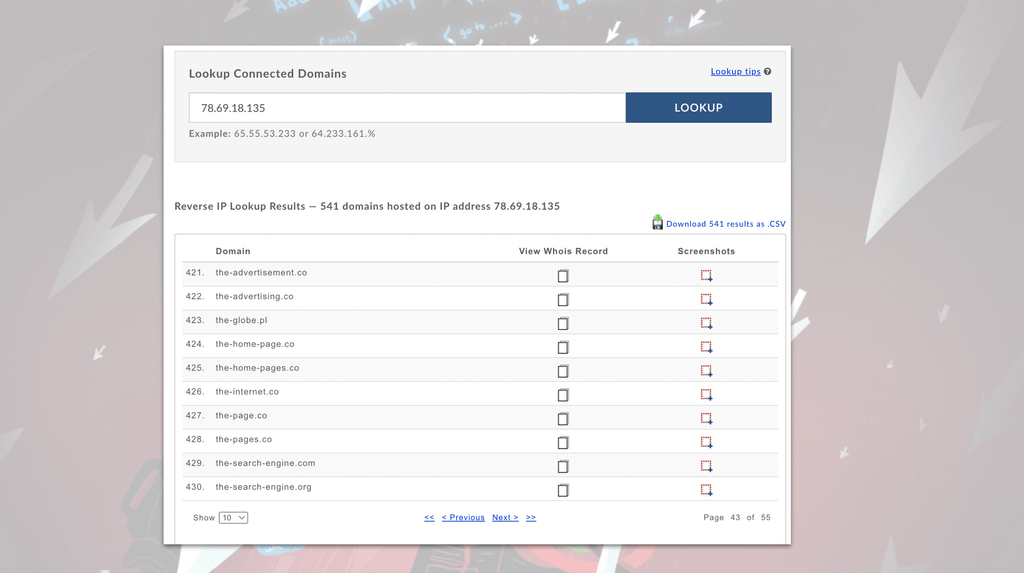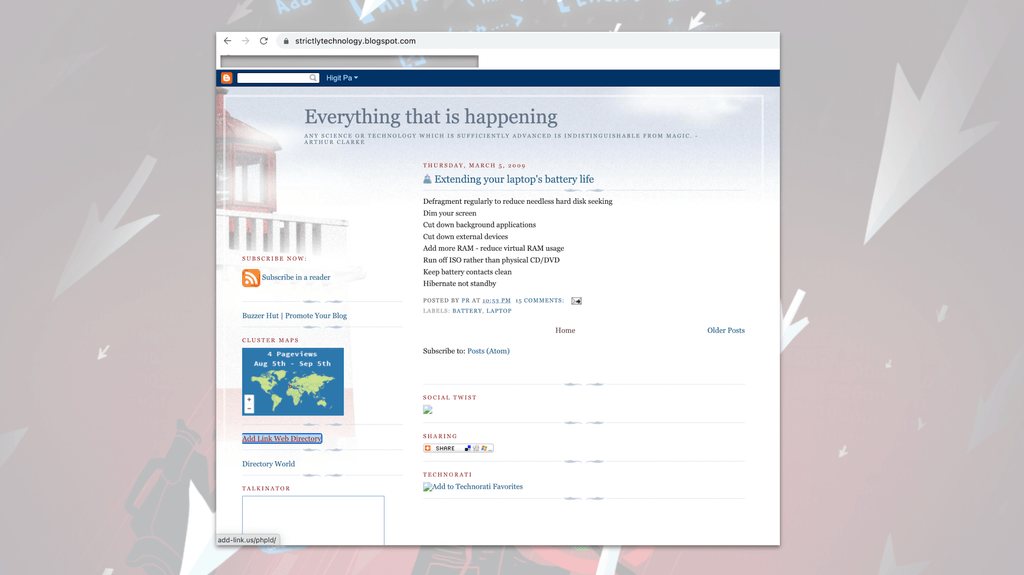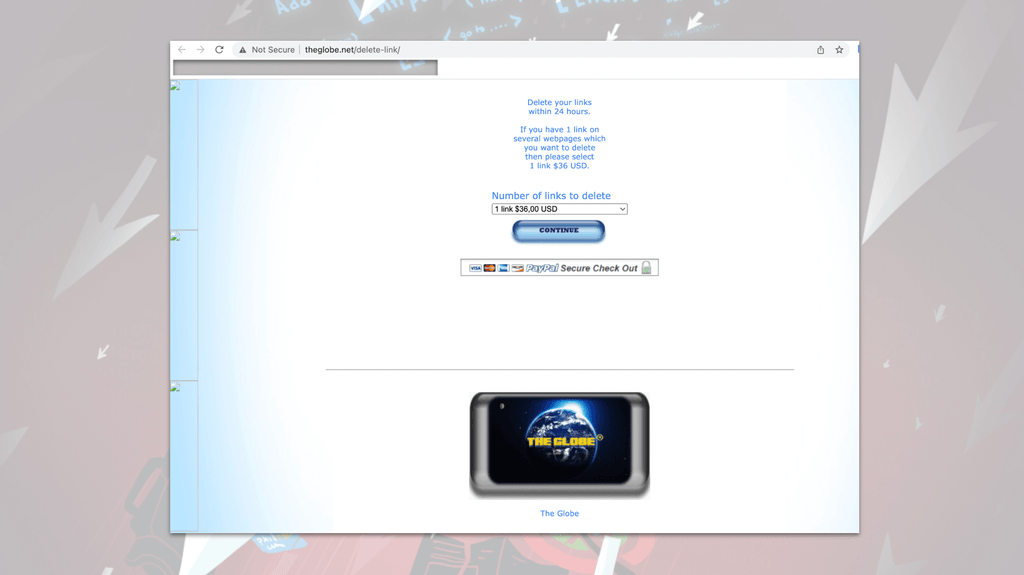
Second of 2 parts
MANILA, Philippines – In Part 1, we explained how we tracked down the identity of a black hat SEO vendor whose website network has been spamming the websites of Rappler, ABS-CBN News and Philstar.
working with Swedish digital forensic group Qurium Mediawe traced the identity of the black hat through the historical domain registration records of one of the websites that was ranked by an SEO tracking tool as highly toxicor probably part of link building schemes.
The website, whose domain name was registered by a Swedish individual, Richard Genmar, shared the same hosting server (IP address 78.69.18.135) with more than 500 other websites. Most of these sites shared the same title: “The Globe – The World’s Most Visited Web Pages”. Hundreds of sites from this same IP address were found in the backlink data for the aforementioned Philippine newsgroups.
 THE BLACK HAT INFRASTRUCTURE. More than 500 dubious websites are linked to IP address 78.69.18.135.
THE BLACK HAT INFRASTRUCTURE. More than 500 dubious websites are linked to IP address 78.69.18.135.
Although the websites hosted by this IP address are simple in terms of functionality and appear to be all dated in appearance, there is no doubt that it took effort and resources to put all the infrastructure in place, let alone maintain -the.
The potential benefits, however, are significant. Assuming targets pay, the windfall could range from tens of thousands to millions of dollars.
Philippine news sites were not the only ones targeted by The Globe. In one submission to the Google Search Console help websitea webmaster also reported encountering spam link issues from theglobe.net.
According to the webmaster who reported the issue, they had contacted The Globe numerous times, asking them to remove the backlinks, but only received an automated response. “We also offered to pay them to remove the URLs and they are not responding, my guess is that a competitor has paid to add those links and now they can’t remove them.”
We reached out to Genmar and The Globe by emailing them through their published email addresses. We also asked if they would be willing to remove unwanted backlinks on Rappler and other Philippine news websites free of charge. We have not yet received a response to our questions and will update this story once we do.
A black hat marketing infrastructure
To maintain a domain, an annual fee must be paid to domain registrars like GoDaddy and others, which can range from US$2 (P114.34)* to US$20 (P1,143.46) to thousands of dollars per domain, depending on demand for keywords used in the preferred domain.
Opting for cheaper domains would still cost anywhere from $1,000 (P57,172) to $10,000 (P571,828) per year to maintain 500 domains. This excludes the cost of hosting the site, which could be much more.
The Globe has not limited its operations to its self-hosted websites. While it’s not possible to connect The Globe to most of the Blogspot and Firebase blogs that have been spamming Rappler, there are indicators that it has also been abusing those services to grow its websites. For example, the blogspot website below links to add-link.us, one of over 500 sites hosted at the IP address 78.69.18.135.
 ABUSE BLOGSPOT. Backlink data revealed numerous blogspot accounts linked to infrastructure owned by The Globe.
ABUSE BLOGSPOT. Backlink data revealed numerous blogspot accounts linked to infrastructure owned by The Globe.
why us
Why would a Swedish black hat operator who can possibly pursue more lucrative goals choose to waste time and resources building tens of thousands of backlinks to Philippine news websites? Were the people behind The Globe responsible for targeting these news sites or were they paid by others to provide this service?

At last check, the search tracker has already flagged 1,439 unwanted backlinks to Rappler from this specific group of sites. If they were all paid, it looks like someone paid $4,317 (P246,817) just to spam Rappler. Also, 1,256 additional backlinks to Philstar would have cost $3,768 (P215,435). Another 867 backlinks to ABS-CBN would have cost $2,901 (P165,852).
If adding backlinks is expensive, removing unwanted backlinks from websites operated by “The Globe” is even more expensive. The Globe also charges $36 to remove unwanted backlinks from their toxic sites.
At this rate, the three Philippine news websites will have to pay tens of thousands of dollars each to get The Globe to remove backlinks from the group of sites that share the title: “The Globe – Most Visited Web Pages Of the world”.
In Rappler’s case, the bill could be a staggering $51,804 (P2,961,677) for 1,439 backlinks. For Philstar, it’s $45,216 (P2,585,139) for 1,256 backlinks. Finally, for ABS-CBN News, it would be $31,212 (P1,784,487) for 867 spam backlinks.
 BLACK HAT EXTORTION SCHEME. The Globe charges websites an absurd amount of US$36 to remove unwanted backlinks from their network of websites.
BLACK HAT EXTORTION SCHEME. The Globe charges websites an absurd amount of US$36 to remove unwanted backlinks from their network of websites.
We are still not talking here about backlinks from other dubious sites, some of which are linked to this Swedish black hat network.
At these prices, if all the backlinks to the three Philippine news websites are taken into account, the black hat operators could hold the traffic of the news websites hostage for a price that could range from hundreds of thousands and over a million dollars.
For an industry already struggling with the loss of advertising revenue to the Internet giants, it’s an absurd sum.
Payments for The Globe websites are made via Paypal to an entity called The Globe Enterprises. Data reflected on the website of the Swedish Business Registration Officethe Swedish Companies Registration Office, indicates that this company is based in Stockholm County, Sweden.
Data published on the information portal Justia.com indicate that the mark was intended to be used for the following goods and services: “Web site search engine services, namely, providing search engines for the Internet.”
Clearly, the Globe’s services have nothing to do with “providing search engines for the Internet.”
Chasing Black Hat Salesmen
After you find a black hat backlink spammer, what happens?
Unfortunately, identifying who launched a backlink spamming operation is one thing. Holding these actors responsible for the aggravation and problems is another.
Because search optimization is a field that few people understand, there are virtually no penalties for bad actors and their manipulative schemes.
A website owner can always report such operators to Google, the world’s dominant search engine, but Google itself is very secretive about how it deals with reports regarding manipulative links.

The only advice Google gives website owners regarding spam backlinks is to remove them themselves or report them via your deauthorization tool.
The first tip, however, assumes that the website owner is complicit in the manipulative link building scheme.
As we discussed in our previous stories, backlinks are generally desirable. However, Black Hat SEO vendors have been tinkering with the process manipulative link building schemes. This has triggered an arms race between Google and other search engines and these black hats. Google engineers, in effect, had to constantly think of indicators that could identify possible manipulative schemes.
In this battleground, victims of negative SEO attacks like Rappler and other Philippine news sites become collateral damage.
from Google guidelines for webmasters explain as much: “In some circumstances, inbound links can affect Google’s opinion of a page or site. For example, you or an SEO you hired may have built bad links to your site through paid links or other link schemes that violate our quality guidelines. First, we recommend that you remove as many spammy or low-quality links from the web as possible.”
Obviously, this is not possible when it comes to toxic backlinks on Philippine news sites.
Genmar and The Globe have not yet responded to our email asking if they would consider removing the unwanted backlinks at no cost to the news organizations.
The only way website owners can tell Google that they are not complicit is through the opt-out process. In effect, website owners must tell Google that they are disavowing bad backlinks.
This process involves submitting a list of backlinks or domains for disavowal through Google Search Console, which is usually accessible to website administrators. for “unauthorized” these backlinks, the webmaster tells Google that he is disavowing the listed backlinks and should therefore be ignored by the search algorithm.
Rappler has been going through this process since it discovered spam backlinks.
Google, however, reminds webmasters to use disavow with caution because legitimate backlinks could be disavowed in the process. To avoid this, you need to research massive amounts of backlink data, and undoing the effects of a negative SEO attack could take months.
Anti-Spam Laws they are usually related to email and do not cover backlink spam.
Spamming isn’t even illegal in the Philippines. In the 2014 case of Disini, Jr. v. Secretary of Justice regarding the Cybercrime Prevention Act of 2012, the Supreme Court of the Philippines said that unsolicited commercial communications or spam are “legitimate forms of expression.” The National Privacy Commission he cited this in his October 2020 response to a letter writer which requested an advisory opinion on this issue.
The closest that could be cited is a provision of the e-commerce law about “interference” in a computer system or information and communication systems, according to information and technology law expert JJ Disini.
In the absence of clear sanctions, the murky waters of the World Wide Web will remain a playground for black hat operators. – with Bingbong Recto and Ogoy San Juan/Rappler.com and Tord Lundström, Qurium Media
*Conversion rate: $1 = P57.18
[ad_2]
Source link




